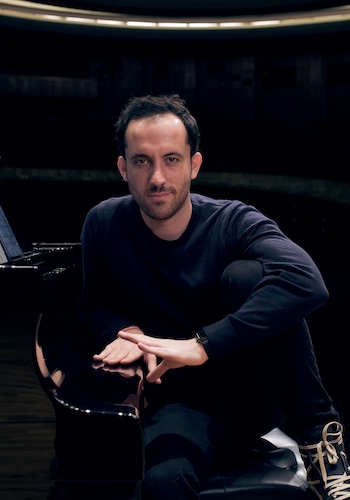Classical Concert Review: Pianist Igor Levit — A Beethoven Recital to Remember
By Susan Miron
More proof that, with pianist Igor Levit, Beethoven had found new interpreter, not only worthy, but important.

Pianist Igor Levit. Photo: Felix Broede.
There was a palpable excitement in the air as a sold-out audience at Jordan Hall awaited the German -Russian pianist Igor Levit to being his Celebrity Series recital of Beethoven’s otherworldly last three piano sonatas. I do not recall a concert that has been so eagerly anticipated, possibly because of the unusual nature of how many us initially got to hear — and hear of — Levit. He became an internet sensation when, at the beginning of the pandemic, he placed fifty-two recitals on Twitter that he dutifully performed in his Berlin living room. Levit, who describes himself on his Web site as “Citizen. European. Pianist.” considers these recitals to be his contribution to boosting global morale during the lockdown. The pianist is an engaged musician in other ways as well: he has aggressively condemned racism and antisemitism. At times his public outspokenness has come at a steep personal cost.
In 2013, in his mid-twenties, Levit launched his album career with Beethoven: The Late Piano Sonatas. This was followed by what has become a landmark recording of all 32 Beethoven sonatas. After this, it became clear to critics and other classical music devotees that Beethoven had found new interpreter, not only worthy, but important.
Beethoven’s last three sonatas are one of piano literature’s most dazzlingly memorable creations. On Saturday night, Levit distinguished himself from the top with the opening of Op. 109 in E major, which he played with exquisite delicacy and preternatural tranquility. I found the quiet moments throughout this performance of the sonata unexpectedly moving, often thrilling; they reminded me of fluttering butterflies. Then, suddenly, Levit would launch into an exciting, volcanic eruption of energy that jolted the heart. Op. 109’s third movement, a calm meditation, sounded to me at times like a love song.
Levit segued immediately into the lyrical Op. 110 in A flat major, and I felt I was hearing the piece anew. That sonata as well as the rhythmically visionary last one (Op. 111 in C minor) were given spellbinding performances. With one caveat: the distraction of Levit’s posture at the piano. I am reluctant to bring this up, but he uses his whole upper body (and his left leg) to produce the sounds he wants. Sometimes he bends from the neck, head close to the keyboard. Other times he bends at the waist, his head, as it faces the floor, bent into his chest. When a hand is free hand it seems to be conducting.
Levit’s idiosyncratic pose does not seem to bother many listeners. Levit was clearly a huge hit; thunderous applause greeted him after Op. 110. He deployed his adroitly modulated pianissimos and demonically energetic fortes throughout Op. 111 in C minor, which opens with a rumbling left hand, the right hand playing angelically. His controlled yet exhilarating performance transformed Beethoven’s last visionary sonata into a panoply of moods and expressions, an experience that was both intellectually and musically compelling. No doubt about it, this was a remarkable Beethoven recital.
Susan Miron, a harpist, has been a book reviewer for over 30 years for a large variety of literary publications and newspapers. Her fields of expertise were East and Central European, Irish, and Israeli literature. Susan covers classical music for the Arts Fuse and the Boston Musical Intelligencer.
